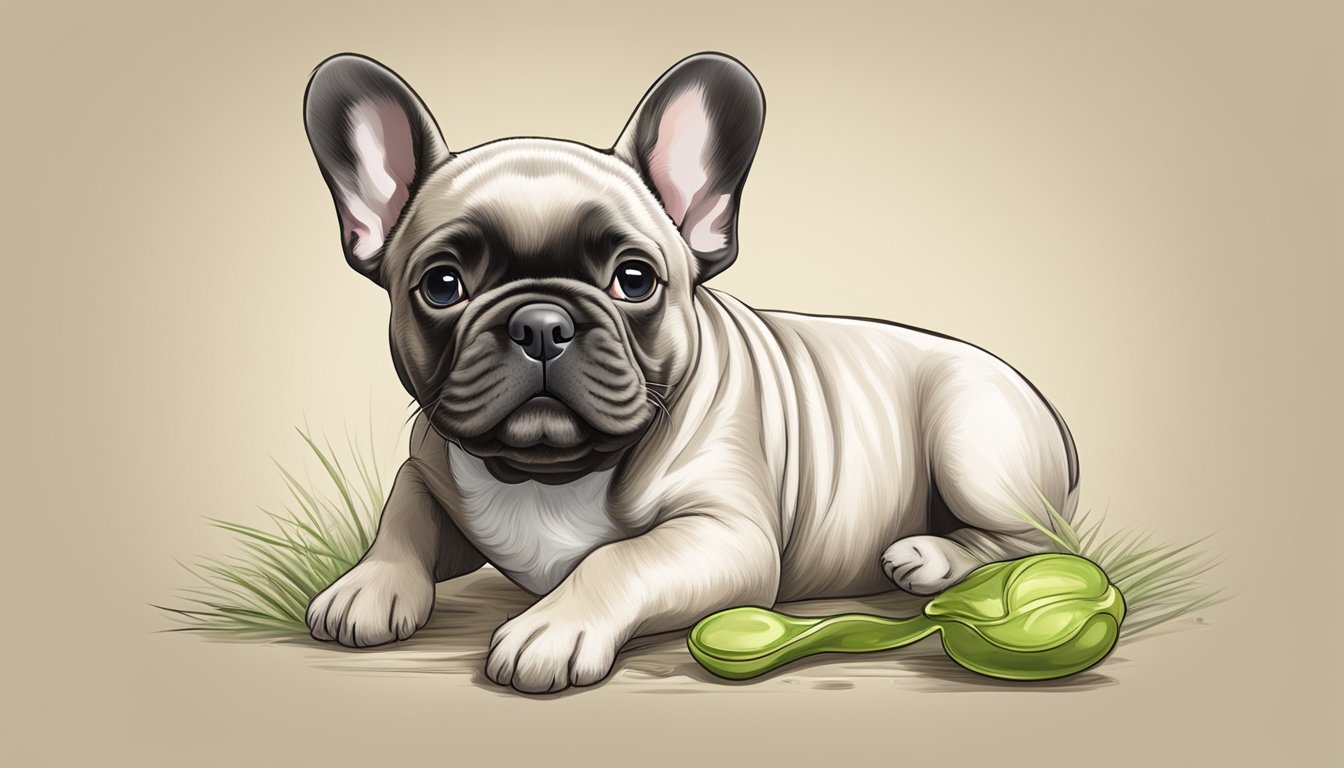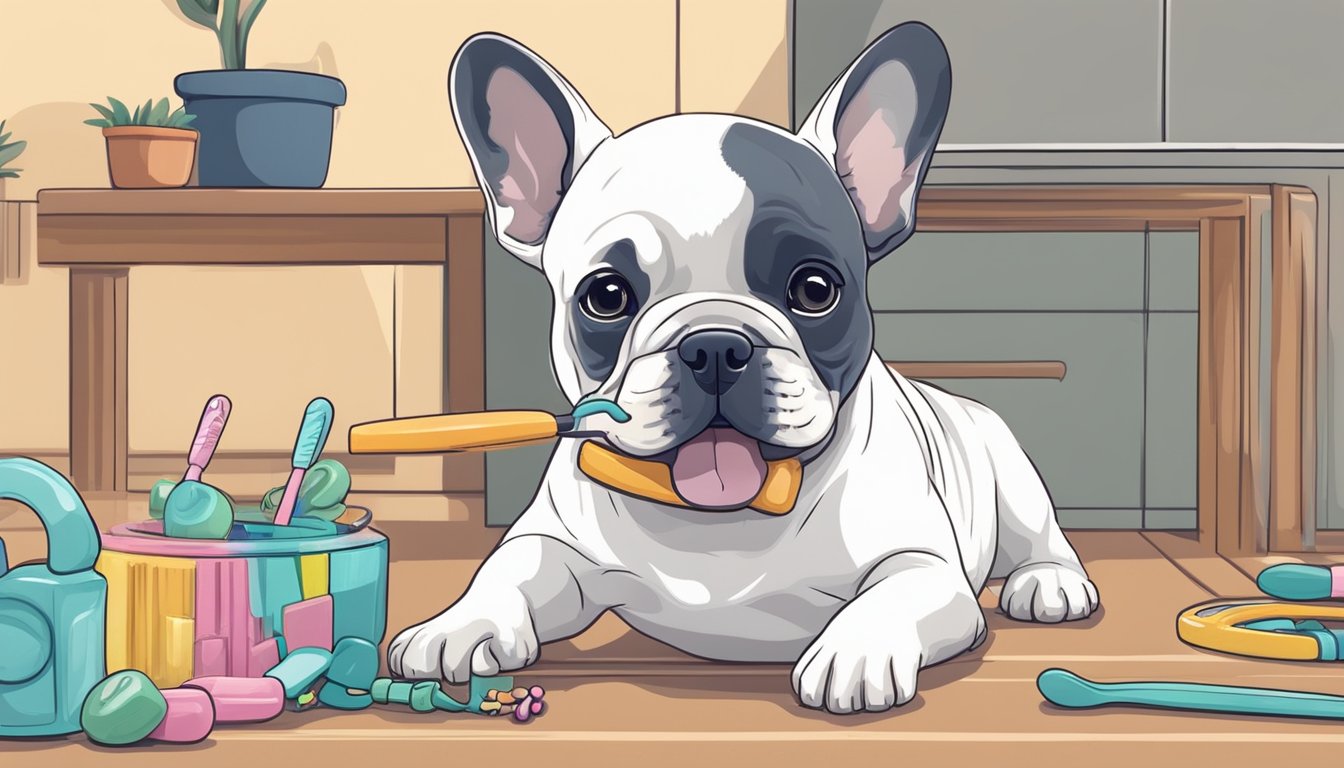French Bulldog Puppy Teething Remedies

Teething is a natural part of a French Bulldog puppy’s development, and this phase brings some discomfort and challenges for both your Frenchie and you. Understanding their dental development and recognizing the signs of teething are essential to ensure that your French Bulldog puppy grows up with a healthy mouth. Ensuring they receive the proper care and nutrition during this stage is also crucial to their overall well-being.

As your puppy’s baby teeth make way for adult teeth, it’s important to provide effective teething remedies to ease their pain and discomfort. Providing appropriate teething toys and products, as well as troubleshooting teething troubles and complications, are key parts in ensuring that your puppy’s dental health remains in top condition.
In this guide, French Bulldog Puppy Teething Remedies, we’ll explore practical and comforting remedies to ease the discomfort during this teething period, ensuring a smoother experience for both your puppy and your household.
Contents
Key Takeaways
- Understand your French Bulldog puppy’s dental development and recognize teething signs.
- Provide effective teething toys and products to help alleviate pain and discomfort.
- Focus on proper care and nutrition during the teething phase to maintain overall health.
Table of Contents
Understanding Your French Bulldog Puppy’s Teeth Development

Have you ever wondered about your French Bulldog puppy’s dental development? Well, you’re in the right place! Let’s have a look at the different stages your Frenchie puppy goes through as they develop their teeth.
Your puppy’s milk teeth start to come through when they are just 2 to 3 weeks old, making way for their incisors, canine teeth, and pre-molars. By around 8 weeks, your puppy is expected to have a full set of 28 milk teeth. But don’t get too attached, as the teething process begins at around 12 weeks of age, kicking off the transition to their adult teeth.
During this teething period, it’s common for your puppy to experience loss of appetite and increased need for chewing. But don’t worry, this is completely natural! Teething in French Bulldogs typically stops around 7 to 8 months of age. At this point, your pup should have a total of 42 adult teeth, including molars that were not present among their baby teeth.
So, what changes in dental development should you keep an eye on? Here is a quick timeline to help you understand the process:
- 2-3 weeks old: Milk teeth (incisors, canines, and pre-molars) start coming through
- 8 weeks old: Full set of 28 milk teeth
- 12 weeks old: Teething begins and adult teeth start to grow
- 7-8 months old: Teething ends with a total of 42 adult teeth
To keep your French Bulldog’s teeth in top shape, it’s crucial to maintain proper dental health. Regular teeth cleaning, a balanced diet rich in calcium, and ensuring that they have access to safe chewing toys can all help in this regard. The AKC also has some helpful tips for keeping your Frenchie’s dental health on track.
Remember, understanding your French Bulldog puppy’s teeth development can help you monitor their progress and ensure they’re growing strong and healthy chompers for years to come!
Recognizing the Signs and Symptoms of Teething

Teething can be an uncomfortable phase for your French Bulldog puppy, but as a responsible pet owner, you can identify the signs and symptoms to make the process easier for them. Let’s dive into the various indicators you should look out for during this phase.
One of the most common signs of a teething Frenchie puppy is their constant drooling. Don’t be surprised if you see an increase in drool, as it’s their body’s natural response to soothe their tender gums. Apart from drooling, you might notice your little friend becoming more irritable than usual. Their discomfort can make them a bit grumpy and you might also observe a change in their attention span.
Chewing and biting behavior is an excellent indication that your Frenchie puppy experiences pain during teething. Puppies tend to chew on various objects – be it toys, furniture, or even your shoes – in an attempt to relieve some of the pain. It’s crucial to supervise your puppy during this time to prevent them from destroying their surroundings or hurting themselves.
Another significant sign is the appearance of swollen, red gums. This inflammation is a natural result of your puppy’s teeth pushing their way through the gums. In some cases, you may even spot small blood spots on their toys or a little blood in their drool, which is normal during the teething process.
While it’s not very common for a teething puppy to have a mild fever, it can happen in some instances. Keep an eye out for any sudden loss of appetite or changes in behavior that may be indicative of a fever. If you notice these symptoms, consult with your veterinarian to ensure it’s not a more severe issue.
In summary, if your Frenchie puppy displays drooling, irritability, chewing and biting, swollen gums, blood spots, or a mild fever, chances are they’re going through the teething phase. Keep a close eye on them and provide appropriate remedies to help alleviate their discomfort during this challenging time in their life.
Effective Teething Toys and Products

Are you looking for ways to help your French Bulldog puppy cope with the teething process? You’re in the right place! In this section, we’ll discuss some effective toys and products that can provide relief and satisfy their chewing urges.
Chew Toys: One of the best solutions for teething French Bulldog puppies is to provide them with a variety of chew toys. These toys can be both fun and stimulating, while also helping to soothe your pup’s sore gums. Some popular options include KONG chew toys and Nylabone dog chews. Make sure to choose toys that are safe, durable, and specifically designed for teething puppies.
Frozen Treats: Another great way to alleviate teething pain and inflammation is by offering your Frenchie puppy some frozen treats. You can fill a KONG toy with wet food, mashed fruits, or yogurt and freeze it. This will not only help numb your puppy’s gums but also encourage playtime and stimulate their curiosity.
Puppy-proof Your Home: As your French Bulldog puppy goes through the teething stage, it’s essential to puppy-proof your home and remove any potential hazards or items they may be tempted to chew on. Puppies love to explore their surroundings, so make sure to keep small objects, shoes, or power cords out of their reach.
Exercise and Playtime: Ensuring that your Frenchie puppy gets enough exercise and playtime is another crucial aspect of managing their teething phase. The more engaged and entertained they are, the less likely they’ll be to chew on inappropriate household items. So schedule regular play sessions and make use of interactive toys to keep your puppy occupied and happy.
To sum it up, providing your teething French Bulldog puppy with a variety of toys, frozen treats, and regular exercise can go a long way in alleviating their discomfort and keeping their chewing tendencies in check. Be patient and attentive to their needs, and they’ll gradually adjust to their new environment and become a loving and well-behaved member of your family.
Troubleshooting Teething Troubles and Complications

Are you dealing with a teething French Bulldog puppy? You might notice discomfort, excessive chewing, and even some loose teeth. Don’t worry, that’s normal! Teething can be a challenging stage for both you and your little Frenchie, but with a few remedies and precautions, you can help ease their pain and avoid complications.
One issue that can arise during teething is misaligned teeth. If you spot this in your pup, it’s essential to consult a veterinarian to assess the severity of the problem and discuss possible treatment options.
To alleviate their discomfort, provide your puppy with appropriate chew toys. These will not only help ease their teething pain but also divert their attention from chewing on furniture or other household items. Additionally, you can try offering them frozen treats or gently massaging their gums.
Your puppy’s biting and nipping behavior can become more prominent during teething. Establishing proper training and reinforcing good behavior is crucial during this stage. If biting occurs, redirect your dog to an appropriate chew toy and reward good behavior with praise.
Separation anxiety can sometimes be a side effect of teething, especially for puppies that are already prone to it. To help with this, create a comfortable and relaxing environment for your pup, including a designated “safe” space with their bed and favorite toys.
On top of teething discomfort, dental issues can also arise for your Frenchie. Regularly inspecting their teeth and gums will help you identify any dental issues that need attention. Brushing your puppy’s teeth and maintaining good oral hygiene habits will ensure a healthy mouth for life.
In conclusion, supporting your French Bulldog puppy through the teething process isn’t always easy, but with care, patience, and proper intervention, you can minimize complications and help them become a happy, well-adjusted adult dog. Happy teething!
Proper Care and Nutrition During the Teething Phase

Caring for your French Bulldog puppy during the teething phase involves paying attention to their diet and overall health. A balanced diet ensures that your puppy has the nutrients needed to support the growth of their adult teeth. So, what should you feed your Frenchie puppy during this period?
Focus on providing a diet that is rich in protein, vitamins, and minerals. Calcium is especially important for the development of strong teeth and bones. Make sure that the food you choose is specifically tailored for puppies, as their nutritional needs differ from adults. If your puppy is experiencing a loss of appetite due to teething discomfort, try offering smaller meals more frequently.
Besides a balanced diet, ensure that your puppy has access to fresh, clean water at all times since proper hydration is essential for their overall health. You may also want to consider adding wet food to their diet to make their meals extra appealing.
While proper nutrition is vital, don’t forget that your Frenchie puppy also needs regular exercise during the teething phase. This will help distract them from the discomfort and allow them to burn off energy. Short, frequent walks and play sessions are a great way to keep your puppy engaged and give them the attention and love they need during this challenging time.
Grooming is another essential aspect of your puppy’s care routine. Regular brushing helps remove loose hair, keeping your Frenchie’s coat neat and tidy. Moreover, it’s an excellent opportunity for bonding and building trust with your puppy.
In a nutshell, to support your French Bulldog puppy’s teething process, prioritize their diet and overall health, including calcium intake, water consumption, exercise, and grooming. By addressing these aspects, you’ll help ensure a smoother transition to their adult teeth and set them on the path to a strong and healthy future.
Puppy Teething Timeline: When Do Puppies Get Teeth
Maintaining Dental Health Post-Teething

As a French Bulldog puppy owner, you’ll want to ensure that your Frenchie’s dental health is a priority once their teething phase is over. Let’s delve into some tips for maintaining a healthy mouth for your beloved pup.
Regular brushing is crucial for keeping plaque and tartar at bay. Make sure to invest in a canine-specific toothbrush and toothpaste, as human products may be harmful to your puppy. Aim to brush your Frenchie’s teeth at least two to three times per week.
Just as humans need to stay hydrated, so do puppies. Providing your Frenchie with fresh water daily can help wash away debris, keeping their teeth and gums healthy.
In terms of nutrition, providing a well-balanced diet filled with essential nutrients is important for overall health, including dental health. Mandating your puppy’s diet with proper nutrition gives them a healthy lifestyle and the energy to exercise. And as we all know, a healthy and active Frenchie is a happy Frenchie!
Speaking of exercise, a daily walk or play session outside can help promote circulation and general well-being, factors that contribute to healthy teeth and gums. Keep things interesting by switching up your walking route or introducing new toys for your Frenchie to play with.
Incorporating dental chews and toys into your pup’s routine is another great idea. These toys can help remove plaque and tartar build-up while providing some entertainment for your Frenchie.
As your French Bulldog grows, you’ll want to keep an eye on their dental progress by inspecting their canines, premolars, and gums regularly. Checking their teeth will help you spot any issues early on, allowing you to reach out to a breeder or veterinarian for advice promptly.
Last but not least, remember that training your puppy early is vital to establishing a long-lasting dental care routine. Start young and be patient, as your Frenchie may be hesitant at first; however, with consistency and positive reinforcement, your Frenchie will learn that proper dental care is a normal part of life. Happy teeth-cleaning!
FAQs: French Bulldog Puppy Teething Remedies

How can I relieve my Frenchie’s teething pain?
You can alleviate your Frenchie’s teething pain using a few simple techniques. Make sure to provide them with safe and appropriate chew toys. Cold items, like ice cubes or a frozen wet towel, can also be helpful in soothing their sore gums. Additionally, gently massaging your puppy’s gums using a clean finger or soft-bristled toothbrush can provide relief.
What are the best teething toys for French Bulldog puppies?
Finding the perfect teething toy for your French Bulldog puppy will depend on their preferences and size. Look for toys made of durable materials like rubber or nylon to withstand their strong bites. Some popular options include KONG toys, Nylabones, and rope toys. Make sure to choose a size suitable for your puppy to prevent choking hazards.
How long does the teething phase last in French Bulldogs?
French Bulldog puppies usually begin teething around 12 weeks of age, and the teething process can last until they are about 7 to 8 months old. During this time, your puppy will lose their baby teeth and grow their permanent adult teeth. Remember that each puppy is unique, and the teething process may vary slightly.
Are there any common teeth problems in French Bulldogs?
French Bulldogs are prone to dental issues due to their brachycephalic facial structure and overcrowded teeth. Proper dental care is essential to prevent problems like plaque buildup, gum disease, and tooth decay. Make sure to brush your Frenchie’s teeth daily and have their teeth checked by a veterinarian at least once a year.
What should I give my teething puppy to chew on?
Provide your teething puppy with a variety of safe and appropriate chew toys to help relieve their discomfort. Look for toys made of durable materials such as rubber or nylon. You can also offer them cold treats like ice cubes, frozen yogurt, or frozen fruit slices to soothe their sore gums. Avoid giving your puppy items that can splinter or break apart, such as rawhide or cooked bones, to prevent choking hazards.
How can I discourage my French Bulldog puppy from biting?
Training your French Bulldog puppy not to bite may take time and consistency. Redirect their biting towards appropriate chew toys and offer positive reinforcement when they chew on them. You can also use the “time-out” technique – briefly ignore your puppy and stop playing when they bite too hard. This will teach them that biting leads to an end in playtime. Additionally, enrolling your puppy in a socialization or obedience class can help them learn acceptable behaviors and proper bite inhibition.






